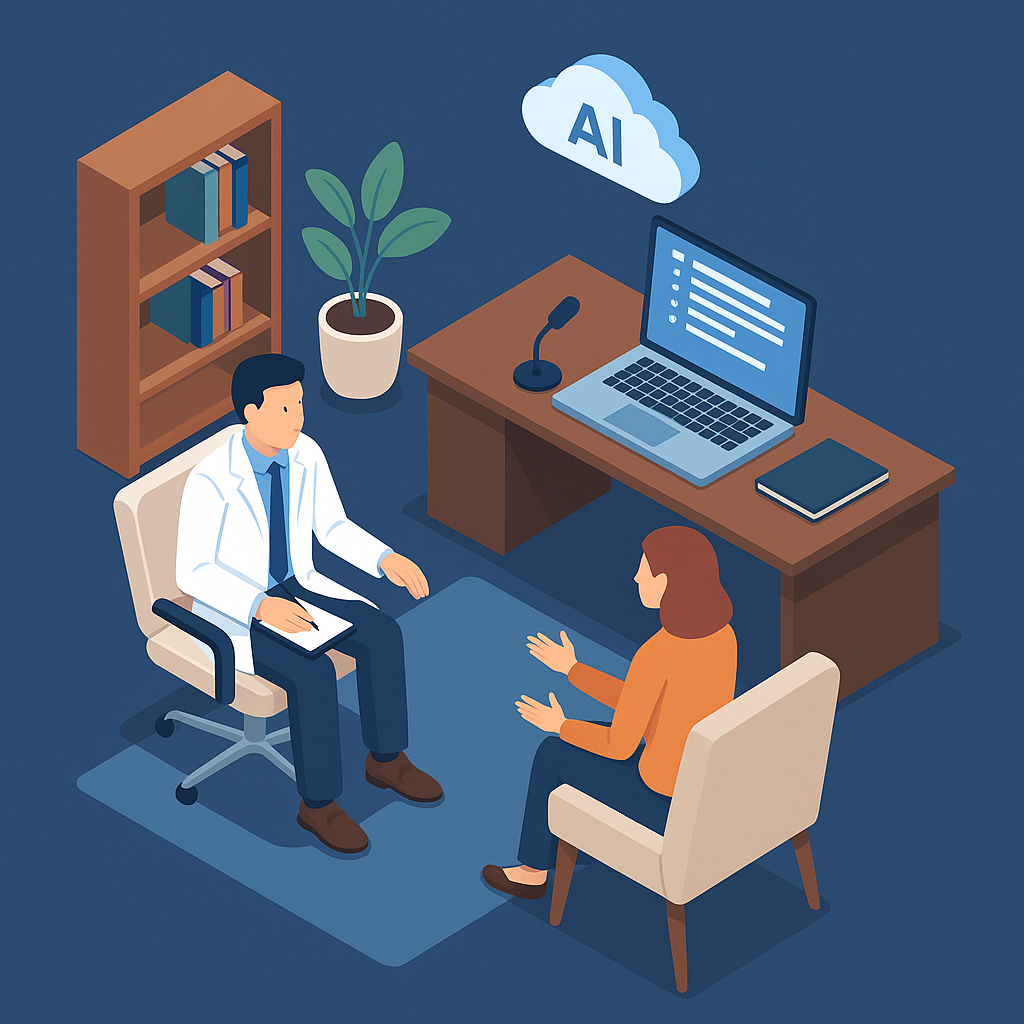Updated on: June 23, 2025
Psychiatry demands presence. But with growing administrative overhead, psychiatrists are spending more time typing than treating. From mood tracking to treatment plans, the documentation load is immense. Enter AI medical scribes — intelligent assistants that transform your clinical conversations into structured notes with zero disruption. In this article, we explore how DocScrib’s AI medical scribe is tailored specifically for psychiatrists, improving both efficiency and empathy in care.
Why Psychiatry Needs AI-Powered Documentation
Psychiatry involves deep, nuanced conversations where tone, language, and subtle emotional shifts all matter. These sessions produce detailed narratives, often hard to capture in real time. Yet, documentation is essential — for legal, clinical, and billing purposes.
AI scribes bridge the gap between thorough documentation and undivided attention, enabling psychiatrists to stay present during sessions while ensuring accurate notes are captured.
Challenges with Traditional Psychiatric Notes
Psychiatrists face unique obstacles when it comes to note-taking:
-
Lengthy sessions: Notes from 60-minute psychotherapy sessions are often dense and multi-dimensional.
-
Manual data entry: Typing or writing notes post-session reduces daily patient capacity.
-
Loss of empathy: Looking at a screen during a session can erode trust and connection.
-
Compliance issues: Incomplete or inconsistent documentation can create liability and billing errors.
AI scribes eliminate these pain points with real-time or post-session note generation.
What Is an AI Medical Scribe?
An AI medical scribe uses speech recognition and natural language understanding to listen to conversations between psychiatrists and patients. It then automatically converts these into clean, structured, and customizable clinical notes — ready for your EHR.
Unlike general dictation tools, AI scribes for psychiatry are trained on:
-
Mental health terminology
-
Therapeutic structures (SOAP, BIRP, DAP)
-
Emotional language and context
-
Medication monitoring notes
Benefits of AI Medical Scribes for Psychiatrists
| Benefit | How It Helps |
|---|---|
| Faster documentation | Saves 3–5 hours weekly on EMR inputs |
| Improved note quality | Captures context, emotions, and key phrases verbatim |
| Reduced burnout | Less after-hours work means better work-life balance |
| Better patient rapport | Sessions feel more personal and empathetic |
| Billing accuracy | Structured notes help justify higher CPT codes |
Whether you’re documenting therapy, evaluations, or med reviews — AI scribes lift the burden.
Key Features to Look For in a Psychiatric AI Scribe
To truly support a psychiatrist’s workflow, an AI scribe must offer:
-
Specialized psychiatric note formats: SOAP, BIRP, DAP
-
Voice separation & attribution
-
EMR-ready export options
-
Support for telepsychiatry
-
Custom terminology for CBT, DBT, and diagnostic frameworks
-
Editable summaries & auto-coding suggestions
DocScrib checks every one of these boxes — and more.
DocScrib: The Best AI Medical Scribe for Psychiatrists
DocScrib is purpose-built for psychiatric clinicians. It’s not a generic scribe with mental health added — it’s trained from the ground up on thousands of psychiatric cases.
Top Features:
-
Pre-trained psychiatric language models
-
Speaker detection to distinguish clinician vs. patient
-
Customizable note styles for therapy, medication, evaluations
-
One-click export to major EHR platforms
-
Offline transcription for telehealth
-
HIPAA-compliant encryption and secure storage
-
Multilingual support for diverse patient populations
DocScrib empowers solo psychiatrists, group practices, and hospitals alike with consistent, high-quality documentation.
Real-World Use Cases
-
Solo practices: Reduce administrative load and expand your caseload.
-
Mental health clinics: Ensure standardized note quality across multiple clinicians.
-
Academic settings: Train residents and interns on best practices for documentation.
-
Telepsychiatry platforms: Scale services while maintaining documentation standards.
A user reported shaving off 20+ hours/month using DocScrib without compromising quality.
Security & HIPAA Compliance
Mental health documentation demands the highest level of privacy. DocScrib delivers:
-
End-to-end encrypted audio streams
-
AES-256 encrypted storage
-
Role-based access control
-
No third-party data resale
-
SOC 2 Type II and HIPAA-compliant infrastructure
With DocScrib, your clinical notes are both secure and compliant.
The Future of AI in Psychiatric Practice
The next decade will see AI scribes evolve from passive listeners to proactive co-pilots. Innovations on the horizon include:
-
Mood trend analytics from voice tone
-
Predictive alerts for crisis intervention
-
Auto-suggested treatment adjustments
-
Cross-session symptom pattern tracking
With these capabilities, AI won’t just document — it’ll help diagnose and plan proactively.
Final Thoughts
AI medical scribes represent a paradigm shift in psychiatric care. By eliminating documentation bottlenecks, psychiatrists gain time, clarity, and energy — to connect, treat, and heal more effectively.
DocScrib isn’t just another productivity tool. It’s a clinical companion that understands psychiatry inside-out.
Ready to Transform Your Practice?
Join thousands of clinicians saving hours daily with AI-powered documentation.
